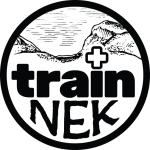Course Comparison

Which course should I take?
Whether you venture out on your own, guide others outdoors, work in a rural area with limited resources, or simply want to be helpful to your community in an emergency, there is a First Aid, CPR, or Wilderness Emergency Medicine Course for you. The big question is, how far are you from definitive care? For our purposes, definitive care is generally considered to be the ambulance or, in some cases, the hospital. If you tend to stay within one hour from definitive care, then First Aid is probably your best bet. If you like to venture further afield, consider a Wilderness First Aid (WFA) course. And if you lead trips or are responsible for others outdoors, we recommend the Wilderness First Responder (WFR) course.
SOLO CPR $40, 4 Hours
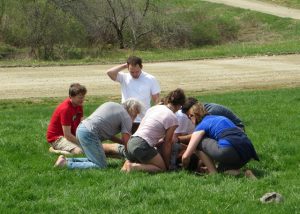
Knowledge of how and why to administer CPR and other critical interventions is a must-have for everyone – particularly anyone in a rural area.
This core SOLO course covers the basics of cardiovascular incident prevention, recognition and response. You’ll gain an understanding and appreciation of risk factors, the importance of early recognition and action when someone you care about experiences an emergency, and specifics on how your efforts translate in a rural environment. You’ll also learn how to intervene in instances of choking, stroke, seizure, heart attack, and cardiac arrest, and will learn why and how to use an AED.
Note: SOLO CPR meets current ILCOR / American Heart Association CPR Guidelines, and is generally accepted by employers requiring you to obtain CPR certification. Ask your employer if SOLO CPR is right for you.
SOLO First Aid $80, 8 Hours
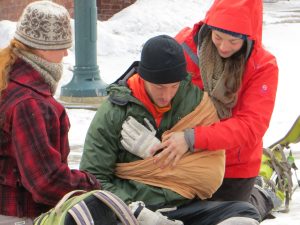
More in depth, engaging and experiential than typical first aid courses, our SOLO First Aid is geared toward active people in rural environments who most often live, work and play within one hour of definitive care.
Cookie cutter first aid courses are everywhere. They are geared toward less active people in urban environments, and are often taught by individuals who only teach occasionally. If you REALLY want to feel engaged while learning how to administer first aid in a rural environment while waiting for further help to arrive, take an 8-hour SOLO First Aid course with Train NEK. We’ll cover patient assessment, recognition and handling of life threats and treatment of the most common musculoskeletal and soft tissue injuries. Course tuition includes instruction, training materials and SOLO certification fee. Results in SOLO First Aid certification, and comes with an opportunity to become certified in SOLO CPR for an additional charge.
SOLO Wilderness First Aid (WFA) $220, 16 Hours
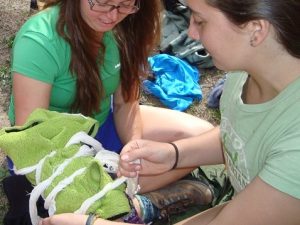
SOLO Wilderness First Aid is ideal for outdoor professionals and enthusiasts who regularly spend time in the outdoors one hour or more from definitive care, because there are additional interventions you can and should do if it’s going to be a while before medical providers reach you.
This includes hikers, climbers, paddlers, bikers, skiers, and anyone else who wants to feel more independent, empowered and capable during outdoor pursuits.
What is Included? WFA tuition includes instruction, textbook and training materials, and SOLO certification fee. Meals and lodging are not included. Certification is good for two years; you recertify by taking the course again. The SOLO WFA can also be used to recertify the SOLO Wilderness First Responder. SOLO Basic CPR is available as an optional adjunct – usually taught at the end of Day One – for an additional $40.
What is Taught? The WFA curriculum focuses on: Prevention, Response and Assessment, Initial Life Threats, Musculoskeletal Injuries including Long Bone Fractures and Advanced Spine Assessment, Environmental Emergencies, Soft Tissue Injuries and Infection, and Medical Emergencies.
What Should I Bring? WFA students are asked to bring clothing suitable for being active much of the day (i.e. rolling around pretending to be injured, and kneeling next to mock patients). They should also bring additional layers to use for building splints, etc. A complete packing list and directions are sent to students following registration.
SOLO Wilderness First Responder (WFR) $800 ($750 for NEK residents), 72 Hours
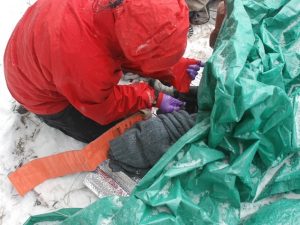
If you engage in expeditions or are regularly in a position of responsibility for others while traveling one hour or more from definitive care, we recommend the Wilderness First Responder.
The WFR is the perfect course for individuals who want a high level of wilderness medical training for extended personal backcountry trips or expeditions, or anyone working in a position of leadership in an outdoor setting. Generally taught over eight days, this 72-hour course is recognized as the industry standard for outdoor professionals including river and mountain guides, outdoor trip leaders, ski patrollers, and others who generally expect to end up in remote settings with limited resources. Topics are covered far more extensively than can be done in the WFA, with additional topics and more time for building muscle memory through hands-on practice.
What is Included? WFR tuition includes instruction, training materials, and SOLO WFR and Advanced CPR certification fees. Lodging and meals are not included. WFR Certification lasts for three years. You recertify by either taking a two-day WFR Refresher (preferred), or by taking a WFA course with some additional studying outside of class.
What is Taught? The WFR takes a comprehensive and in-depth look at the standards and skills of dealing with: Prevention, Response and Assessment, Musculoskeletal Injuries including Advanced Spine Assessment, Environmental Emergencies and Survival Skills, Soft Tissue Injuries, Medical Emergencies, Packaging and Transporting Patients, and Long-Term Care.
What Should I Bring? WFR students are asked to bring clothing suitable for being active much of the day (i.e. rolling around pretending to be injured, and kneeling next to mock patients). A complete packing list and directions are sent to students following registration.
Educational/Functional Job Requirements for Wilderness Medical Students and Providers Based on the Department of Transportation’s First Responder curriculum, the Wilderness First Responder is a job-training program which integrates wilderness and medical training and leads to certification. As such, candidates must meet all First Responder functional job requirements in order to become certified.
Does the WFR Count as Continuing Education? The WFR typically counts toward continuing education credits, although it may depend on what certification you have. Street EMTs who take the WFR course may become certified as Wilderness EMTs.
WFR Review $245, 16 Hours
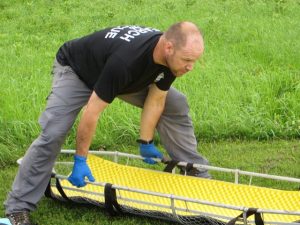
Use this course to recertify a Wilderness First Responder gained from an organization having reciprocity with SOLO. (SOLO WFRs have the additional option of recertifying by taking a SOLO Wilderness First Aid course.)
Recertify your WFR with others who share the same training as you! This two-day course is bound to leave you feeling more refreshed on your skills than recertifying via a WFA. Rather than starting from scratch, participants can get right into the medical and trauma review and refresher scenarios, and will have a chance to practice WFR-specific skills. WFR Review tuition includes instruction, training materials, and SOLO recertification fee. (Be prepared to submit copies of your current CPR and expiring WFR cards.)
Wilderness Module $825, 40 Hours
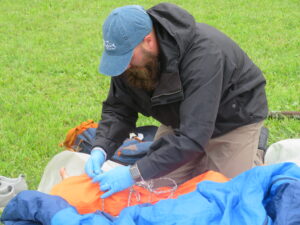
SOLO’s Wilderness Module is a 5-day street-to-backcountry bridge course that upgrades current EMTs/paramedics to the Wilderness EMT level, and other healthcare professionals to the WFR level.
WHY THIS COURSE? Join other medical professionals for an in-person retreat to focus on how to provide high quality patient care when separated from definitive care by distance, time, or circumstance. Learn how to apply your skills and knowledge in remote locations and challenging situations without access to all the resources used in the frontcountry.
WHAT IS TAUGHT? We’ll focus on patient assessment, initial and long-term care and evacuation, as well as the challenges posed by rough terrain, limited resources, inclement weather, and difficult patient access. This course builds on your existing medical education to expand your toolkit and emphasizes improvisation, critical thinking, and communication. We encourage EMTs, paramedics, nurses, PAs, doctors, and other medical providers to take this 5-day course. This course does not include CPR.
WHAT IS INCLUDED? Tuition includes instruction, training materials, and SOLO course fee. Successful completion of the course requires 100% attendance and passing grades on all tests and assessments including written and practical exams.
UPON SUCCESSFUL COMPLETION: Two-year Wilderness Emergency Medical Technician certification (for current EMTs AEMTs, & Paramedics) OR Three-year Wilderness First Responder certification (all other current medical practitioners). This course also typically counts as 40 hours of continuing education for National Registry EMTs. It is the student’s responsibility to confirm eligibility for Continuing Education Units with their governing body.
© Train NEK | Wilderness Medicine 2020
